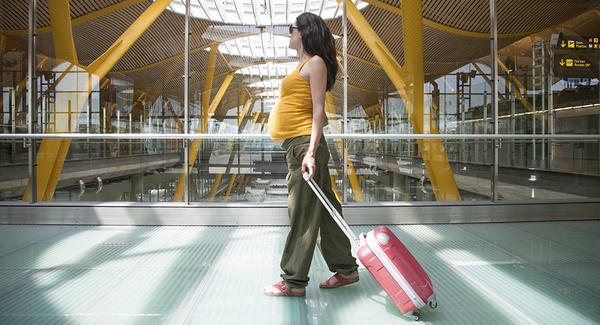For most women, providing you are experiencing a calm and trouble free pregnancy, flying is perfectly safe for most of the duration of your pregnancy. However, if you have a high risk pregnancy it would be prudent to get the advice of your medical practitioner before booking any flights.
The second trimester (14 – 27 weeks) is the best time to fly, as a lot of women experience morning sickness in the first trimester which can be exacerbated if combined with motion sickness.
During the second trimester energy levels become higher and the risk of miscarriage lowers. Once you get into the latter part of the third trimester, the risks become greater and most airlines will not take a pregnant woman over 36 weeks.
Arrange for your Doctor to give you a detailed letter containing your medical history, any pregnancy concerns, ultrasounds and test results, and any other relevant information that would be useful should you need to see a Doctor at your destination.
Are metal detectors safe?
When we go through security at an airport we are all required to walk through a metal detector ‘archway’. If the buzzer sounds then a further search with a hand held wand will take place to identify the trigger metal. Often this is a pair of earrings or a buckle that we just simply forgot to remove.
These devices are low-frequency electromagnetic detectors, specifically designed to look for weapons. The emissions from these metal detectors are very low level and considered safe for pregnant women. If you still feel uncomfortable with this process you can be physically “patted down” by a female security control officer. This is your right and you can insist on this if you so wish.
Does cabin pressure affect my unborn baby?
Generally, a healthy pregnant woman or her baby will not be affected by cabin pressure. However, in order to process the oxygen your body needs at higher altitudes, your heart rate and blood pressure will increase. If you suffer from anemia, sickle cell disease, or have a history of blood clots then it is not recommended that you fly.
Will altitude affect my morning sickness?
This may affect you, as the changes in altitude as it increases can cause nausea problems both during flight and after you land. This is particularly common with pregnant women when temperature and height are extreme, e.g., if you are visiting a cold mountain destination or a tropical hot destination. This could affect your equilibrium for a few days, but should return to normal quickly once your system adapts to the new environment. If this happens, try to rest up until it subsides.
You will need to drink more water than normal as it’s easier to dehydrate at high altitudes and tropical climates. If you find that you are sick with nausea, sipping small amounts of water frequently will help both you and your baby by carrying vital nutrients through your blood stream.
Should I fly during my third trimester?
It is generally fine to fly during this trimester, as long as you are no further on than 36 weeks. It is recommended that you discuss your options with your health professional prior to planning and booking your trip.
There are some conditions which are higher risk than others and it may be that you just don’t want to take the chance. Serious thought about whether to take your trip in the third trimester should be given if you are carrying twins, have diabetes, have high blood pressure, have experienced bleeding, have placental abnormalities, are expected to go into pre-term labor, or have any history with blood clots.
Every airline carrier has its own rules for women who fly while pregnant and the last thing you need is someone querying your due date at the gate. Everyone is different and some pregnancies look further on than others. Consider how far on you will be on your return flight and take a note from your Doctor, including the expected due date to avoid any problems.
For some extra piece of mind, ask your medical professional to give you a list of who to contact at your destination should you face any complications. Bring a copy of your prenatal chart, especially if you are in your second or third trimester.
Book an aisle seat, preferably in the bulkhead seating as this will give you much more leg room and flexibility for getting up and walking around. If you are unable to reserve this then try for a seat in the middle by the wing for a smoother trip. Sitting for long periods of time increases the risk of blood clots and thrombosis, so try and have a walk around once every hour if possible.
How can I stay comfortable?
As soon as you settle into your seat, remove your shoes. This will help avoid any ankle swelling or leg cramping. If you are lucky enough to have a spare seat next to you, take advantage of it and elevate your legs. Taking regular walks around the cabin and stretching every 30 minutes will help avoid circulation problems.
Can I have vaccinations while pregnant?
It is recommended that pregnant women avoid any countries that require vaccinations. The greatest risks are live vaccinations such as BCG, MMR, oral polio, oral typhoid, and yellow fever. These vaccinations contain a small content of live virus which may cross the placenta.
If you are unable to avoid a destination that requires vaccinations you will need to discuss this in detail with your Doctor, who will be able to advise you of the risks of taking the vaccination while pregnant. If you are travelling to a high disease risk destination, then it is probably lesser risk to you and your baby to get vaccinated, as most diseases are more harmful than vaccines.
Malaria exists mainly in countries such as Africa, South America, Central America, Asia, and the Middle East. Pregnant woman are susceptible to malaria and the results can be fatal. There are preventative treatments available, but much will depend on what stage your pregnancy is at.
While you are at any of these destinations it is vital that you protect yourself against insect bites by using a repellent, wearing long sleeved tops and pants, and always sleep under a mosquito net.

 En
En Es
Es Fr
Fr











